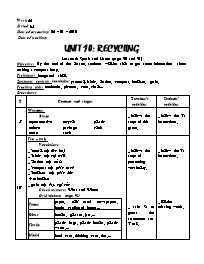Giáo án môn Tiếng Anh Lớp 8 - Unit 10: Recycling - Lesson 2: Speak and listen

UNIT 10: RECYCLING
Lesson 2: Speak and Listen (page 90 and 91)
Objective: By the end of the lesson, students will be able to get some information about making a compost heap.
Technique: integrated skill
Language content: vocabulary: metal, fabric, leather, compost, fertilizer, grain.
Teaching aids: textbooks, pictures, cues, chalk
Bạn đang xem tài liệu "Giáo án môn Tiếng Anh Lớp 8 - Unit 10: Recycling - Lesson 2: Speak and listen", để tải tài liệu gốc về máy bạn click vào nút DOWNLOAD ở trên
Week 22 Period 65 Date of preparing: 02 – 01 – 2010 Date of teaching: UNIT 10: RECYCLING Lesson 2: Speak and Listen (page 90 and 91) Objective: By the end of the lesson, students will be able to get some information about making a compost heap. Technique: integrated skill Language content: vocabulary: metal, fabric, leather, compost, fertilizer, grain. Teaching aids: textbooks, pictures, cues, chalk Procedures T Content and stages Teacher’s activities Students’ activities 5’ Warmer Bingo representative reduce reuse recycle package sock plastic cloth _ follows the steps of this game. _ follow the T’s instructions. 10’ Pre – task Vocabulary _ ‘metal (n): kim loaïi _ ‘fabric (n): sôïi (vaûi) _ ‘leather (n): ñoà da _ ‘compost (n): phaân xanh _ ‘fertilizer (n): phaân boùn à to fertilize _ grain (n): haït, nguõ coác Check memory: What and Where Grid (picture page 91) Paper paper, old/ used newspapers, books, cardboard boxes Glass bottles, glasses, jars, Plastic plastic bags, plastic bottles, plastic wares, Metal food cans, drinking cans, tins, Vegetable matter fruit peels, vegetables, Fabric clothes, pieces of materials, Leather shoes, sandals, schoolbags, _ follows the steps of presenting vocabulary. _ asks Ss to guess the statements are T or F. _ follow the T’s instructions. _ fill the missing words. 17’ While – task Gap – Fill Dialogue A S1: Which group do (1) clothes belong to? S2: Put them in “(2) fabric”. S1: What can we do with (3) those clothes? S2: We can (4) recycle them into paper or shopping bags Dialogue B S1: Is (1) fruit “(2) vegetable matter?” S2: That’s right. S3: What will we do with it? S4: We make it into (3) compost and fertilize our field. _ asks Ss to answer the question on page 90, then compare with their partners. _ answer the question on page 90, then compare with their partners. 10’ Post – task Listen (page 91) a/ A b/ B c/ B d/ B Tape transcript: a/ What type of garbage can you put in the compost? Today I’m going to explain how to start a compost heap. First of all you must use only vegetable matter, which include tea leaves, egg shells – but wash egg shells first – and tissues. Don’t use any meat or grain products because this attracts rats. b/ Where is the best place for a compost heap? Find a place in your garden that gets a few hours of sunlight each day. Use picks or shovels to turn the compost regularly so it gets of air. c/ Should we water the compost? The compost also needs moisture, but it will get this from condensation. Cover the heap with a sheet of strong plastic if the weather is very wet. d/ How long does it take before you can use the compost? Keep adding to the pile and after about six months, your compost will be ready to use as fertilizer. _ asks Ss to listen to the tape, then answer the questions. _ listen to the tape, then answer the questions. 2’ Reinforcement Vocabulary _ ask _ answer 1’ Homework Learn vocabulary and prepare new lesson _ gives homework _ take notes
Tài liệu đính kèm:
 giao_an_mon_tieng_anh_lop_8_unit_10_recycling_lesson_2_speak.doc
giao_an_mon_tieng_anh_lop_8_unit_10_recycling_lesson_2_speak.doc





